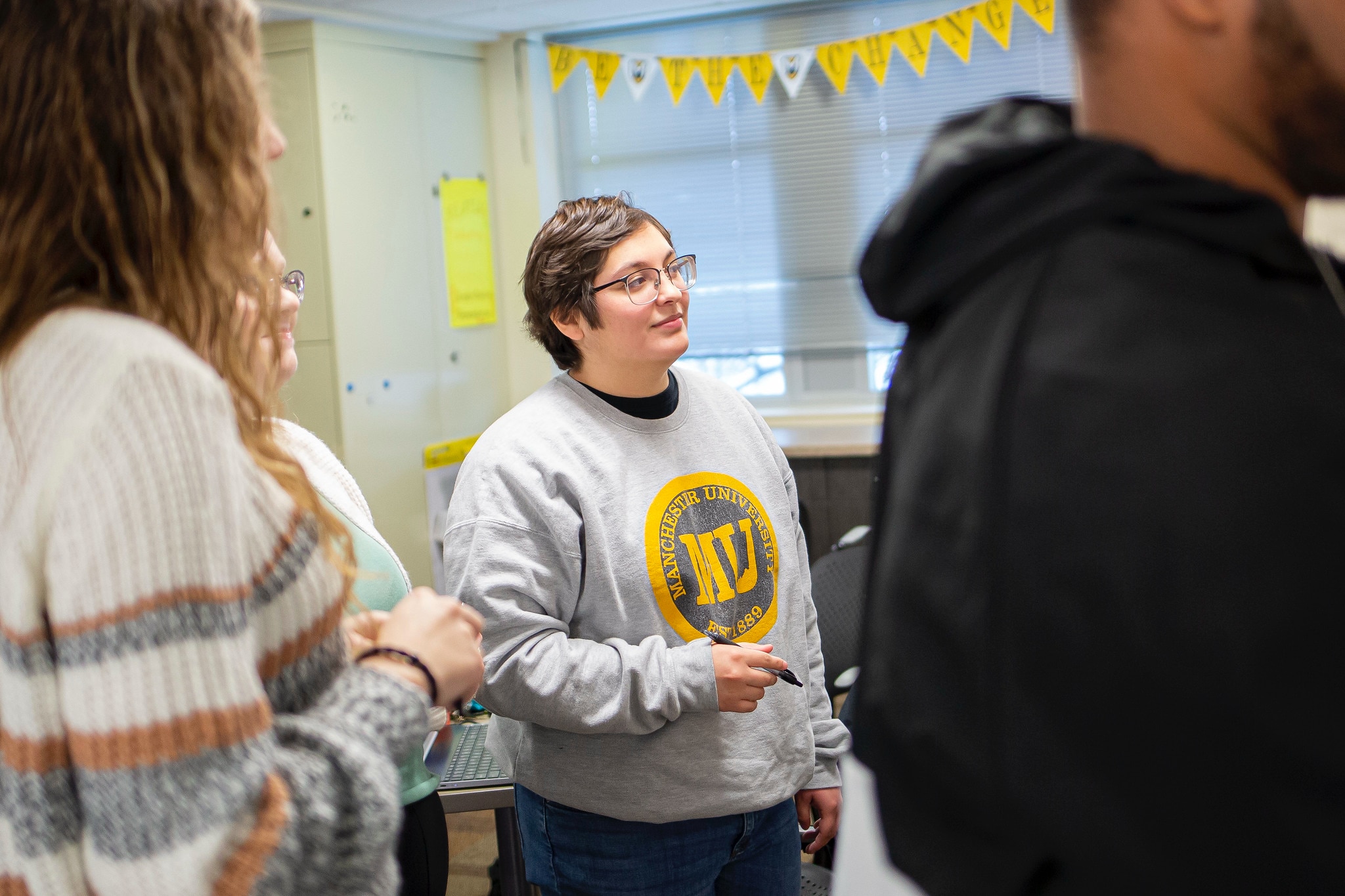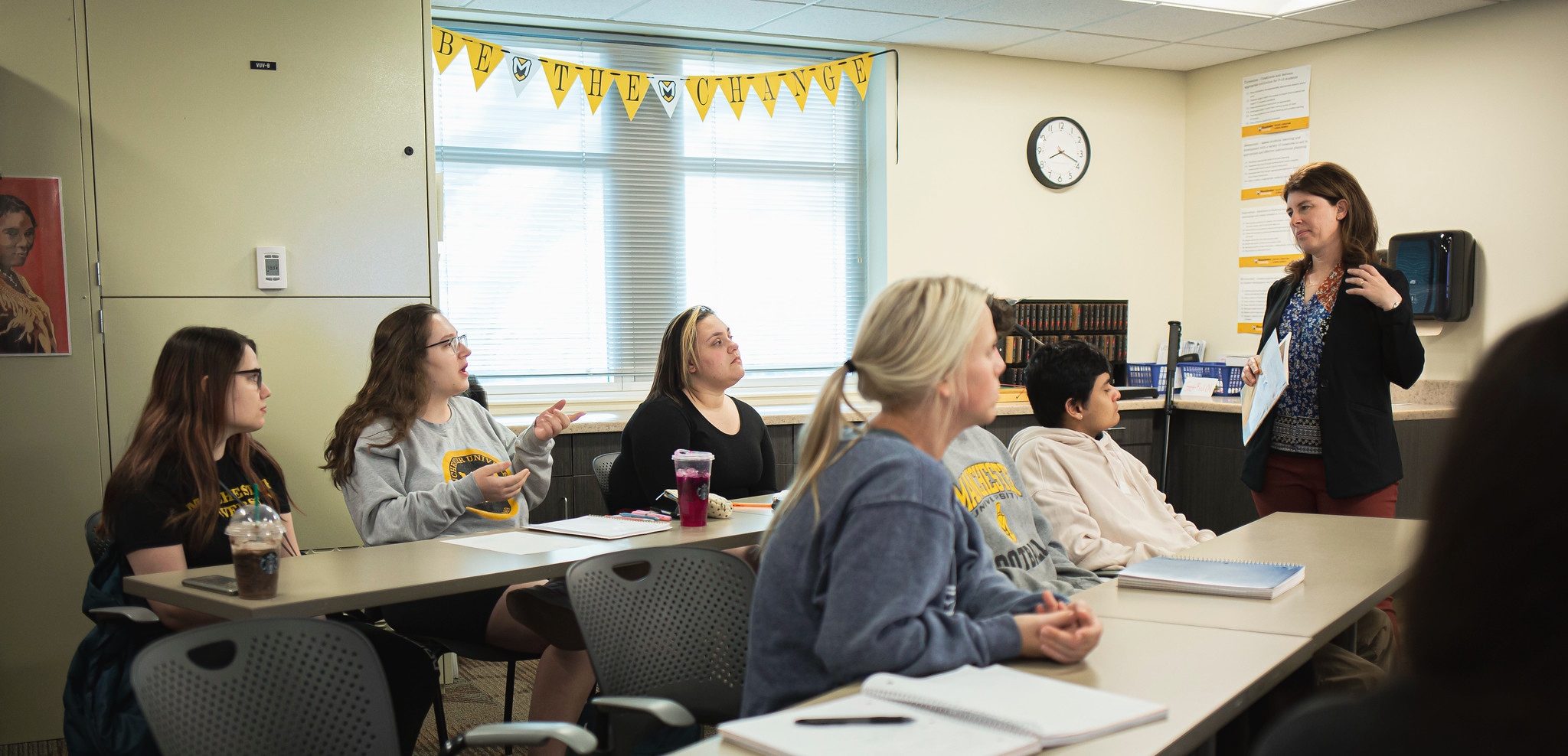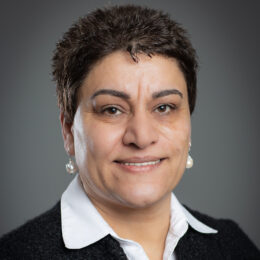Elementary Education: English Learners
Prepare to make a meaningful difference in diverse classrooms with a bachelor of elementary education focused on English learners. Gain early, hands-on teaching experience and complete the coursework needed to earn dual licensure in both elementary education and English as a New Language (ENL).

Empower Future Generations with a Bachelor of Elementary Education Focused on English Learners
Manchester University’s Bachelor of Elementary Education with a concentration in English Learners prepares you to teach in today’s diverse classrooms. From your first semester, you’ll gain hands-on experience in rural, urban, and suburban schools. This program leads to dual licensure—K–6 elementary generalist and P–12 English as a New Language (ENL)—equipping you to meet the needs of multilingual learners. Through coursework, field placements, and mentorship, you’ll develop the skills, empathy, and cultural awareness needed to foster academic success for all students.
Program Information:
- 120 Credit Hours
Minor | TESOL
- 18 Credit Hours
Location
- North Manchester
Why Choose MU for an Elementary Education Degree?

Early and Immersive Classroom Experience
TESOL Minor with Licensure Alignment
High Job Placement Rates
What You Can Do With Your Elementary Education: English Learners Degree
Elementary School Teacher
Teach core subjects to children in K–6 general education classrooms.
English as a New Language (ENL) Teacher
Support multilingual learners in K–12 school settings.
International ESL/ENL Instructor
Teach English abroad and experience global classroom environments.
Dual-Language Program Educator
Work in bilingual or dual-language immersion classrooms across the U.S.

Average Starting Salary for Elementary Education Degree Holders
Graduates with a Bachelor of Elementary Education typically begin their teaching careers earning between $45,000 and $60,000 annually, depending on location, school district, and licensure area. According to U.S. Bureau of Labor Statistics data, the median annual wage for elementary school teachers, excluding special education, was $62,340 in May 2024. Entry-level teachers often start closer to $45,000, with opportunities for salary increases through advanced licensure, experience, and continued education. These figures reflect the strong return on investment of a Manchester University degree and highlight the potential for financial stability while pursuing a rewarding career in education.

How the Elementary Education: English Learners Program Supports Your Growth
Early and Ongoing Classroom Experience
TESOL Coursework and Licensure Alignment
Student Teaching and Practicum Experience
Explore the TESOL Minor
The TESOL minor complements the English Learners licensure track and prepares you to teach English as a second language both domestically and abroad. A combined program through English and Modern Languages, the minor includes coursework in TESOL theory, linguistics, and practicum experience.
Graduates have taught in Japan, led adult ESL classes, and supported dual-language immersion programs. Students often complete their practicum at the Learn More Center or through global partnerships such as Hokusei Gakuen University in Japan.
TESOL expands your professional reach and enhances your ability to support diverse classrooms.
Accreditation and Professional Recognition
Manchester’s education programs are fully accredited by the Council for the Accreditation of Educator Preparation (CAEP)and approved by the Indiana Department of Education. These accreditations ensure your credentials are valid and respected both statewide and nationally.
Public reports are available for key metrics, including:
- Teacher candidate impact on P–12 student learning
- Employer satisfaction of program completers
- Graduation rates and licensing data
- Employment outcomes and student loan default rates
Visit the Education Department for more details on accreditation.
Student Groups and Professional Involvement
Join education-focused student organizations and co-curricular activities that support your personal and professional development. English Learners students frequently participate in:
- Literacy outreach and tutoring programs
- ESL-focused community events
- Cross-cultural programming
- Professional teaching conferences
- Statewide education panels and workshops
These opportunities help you build your resume, connect with professionals, and develop leadership skills in multicultural education settings
Alumni Success and Career Pathways
Graduates of the English Learners licensure area go on to teach in K–6 classrooms, adult education programs, and international schools. Many pursue graduate degrees in TESOL, applied linguistics, or curriculum development.
Examples of alumni success include:
- Karen Jimenez-Saucedo ’25: teaches in Manchester’s dual-language program
- Erin Brock ’21: English instructor and MA TESOL student at Ball State
- Haylee Parrish ’18: taught in Japan through the JET program
- Victoria Clark-Conrad ’21: prepared adult learners for the HSE Exam
Our program prepares you to lead in classrooms here and around the world.
Meet the Faculty
Frequently Asked Questions About the Elementary Education: English Learners Degree
What is the focus of the Elementary Education: English Learners program?
Students gain hands-on experience in elementary classrooms across various school districts, preparing them to meet the needs of diverse learners. The curriculum includes general education courses as well as specialized elementary education courses focused on inclusive instructional strategies and classroom management skills. This program helps future teachers support student learning and academic success—especially among multilingual populations.
The program leads to dual licensure: an initial teacher licensure in K–6 elementary education and a P–12 license in English as a New Language (ENL). It also aligns with the TESOL minor, offering a pathway to teaching both domestically and abroad. Whether you plan to teach in public elementary schools or pursue opportunities overseas, this elementary education bachelor track prepares you to thrive in today’s diverse learning environments.
Will I graduate with a teaching license through this program?
As part of the teacher education program, you’ll complete coursework in classroom management, language acquisition, literacy development, and instructional strategies. You’ll also fulfill rigorous state requirements through student teaching placements and TESOL practicum experience. These hands-on experiences in elementary school classrooms and language support programs help students successfully complete licensure evaluations while building critical thinking and instructional planning skills.
Manchester’s educator preparation includes close mentorship from faculty, licensure advising, and real-world teaching experiences. The program not only satisfies state requirements for teacher certification but also makes graduates more competitive in many school districts actively seeking teachers with English learner training.
Whether you pursue work in public elementary schools, dual-language programs, or international education, this elementary education degree prepares you to obtain licensure and immediately enter the teaching profession with confidence.
How is the TESOL minor integrated into the degree?
All TESOL minors complete a practicum as part of their preparation. These student teaching experiences often take place at local institutions like the Learn More Center or through virtual international placements, such as with Hokusei Gakuen University in Japan. This real-world practice supports student learning and provides firsthand insight into language instruction techniques.
By incorporating the TESOL minor, students are equipped with instructional strategies to work with English learners in both general education courses and targeted language support environments. This enhances their effectiveness in elementary classrooms and strengthens their resumes for school districts seeking multilingual specialists.
In addition, the TESOL coursework aligns with the requirements for English as a New Language licensure in Indiana, streamlining the path to teaching certification. Whether you aim to teach in public schools, work abroad, or transition into ESL-focused roles, this integration of the TESOL minor ensures your bachelor’s degree prepares you for a wide variety of impactful teaching careers.
What kind of field experiences will I have?
By senior year, students complete a semester-long student teaching experience, fulfilling state requirements for teacher licensure and applying what they’ve learned in classroom management, literacy instruction, and instructional planning. Student teachers work alongside licensed educators to support student achievement and engagement in elementary education settings.
Students in the English Learners track also participate in a TESOL practicum, supporting multilingual students either in local communities or via international partnerships. This dual experience prepares graduates to teach in a variety of settings—from public elementary school classrooms to adult ESL programs or global education systems.
Manchester’s educator preparation ensures that all graduates leave not only with theoretical knowledge but also the practical tools to lead a classroom, support student progress, and adjust instructional practices to fit the needs of all learners—especially those developing English language skills.
How successful are graduates of this program in finding jobs?
This strong job placement rate is a reflection of the program’s rigorous educator preparation, field experience, and alignment with in-demand licensure areas. Graduates hold both a K–6 elementary education teaching license and a P–12 ENL license, which increases versatility across school districts and grade levels. This makes our elementary education teachers particularly appealing in districts seeking to support multilingual and diverse learners.
The program develops foundational knowledge through carefully sequenced teacher education courses, from literacy development to instructional planning. Students examine effective teaching practices and gain critical thinking skills needed to adjust lessons to fit a range of learners.
In short, Manchester’s elementary education program not only prepares students for licensure—it equips them to be responsive, career-ready educators who can lead classrooms and positively impact student learning outcomes from their very first year of teaching.
Can I teach abroad with this degree?
The TESOL minor, which is built into the elementary education degree, offers courses in second language acquisition, cultural responsiveness, and classroom management strategies that are applicable both domestically and internationally. You’ll develop instructional strategies that meet the needs of English learners and build conceptual understanding across linguistic and cultural boundaries.
Graduates leave with experience from both student teaching in U.S. elementary schools and additional practicum hours supporting ESL learners. These co-curricular experiences are highly regarded by international schools and language programs looking for educators with a global perspective and practical teaching skills.
Whether your goal is to travel, engage with international communities, or broaden your professional experience, this elementary education bachelor program opens the door to meaningful teaching opportunities worldwide—all while giving you a strong foundation to return and teach in U.S. school districts if you choose.
What support will I receive during the program?
Advisors help guide your course selection and licensure progress while also connecting you to field experiences that match your interests. As part of this teacher education program, you’ll complete general education courses alongside targeted elementary education courses, all of which support student engagement, lesson planning, and literacy instruction.
Students receive regular feedback during their student teaching experience and TESOL practicum. This mentorship helps sharpen classroom management skills and improves instructional practices, preparing you for success as both an elementary school teacher and English as a New Language specialist.
Manchester also encourages participation in student groups, professional teaching conferences, and community outreach programs, all of which enhance your leadership skills and resume. Whether you’re looking to strengthen your teaching certification readiness, improve your critical thinking, or engage with like-minded future educators, this program ensures you’re supported every step of the way toward becoming a confident and compassionate elementary educator.
Elementary Education: English Learners Learning Outcomes
Program Learning Outcomes
The mission statement of the Manchester University Department of Education is to bridge theory and practice, preparing students for professional careers that promote individual well-being, community engagement, and social justice.
Learning Goals: Graduates of our program will
- bridge theory and practice by applying their knowledge and skills in semester long internships or student teaching placements
- assess learning and development or the effectiveness of organizational programs designed for children, adolescents, and/or adults
- establish professional and reciprocal relationships with others invested in the emotional, physical, and cognitive well-being of others with whom they work
- create positive and caring environments for the development and academic progress of children, adolescents, and/or adults
- reflect on their role in the field of education as a means for bringing about social justice
InTASC Standards
1. Learner Development
The teacher understands how learners grow and develop, recognizing that patterns of learning and development vary individually within and across the cognitive, linguistic, social, emotional, and physical areas, and designs and implements developmentally appropriate and challenging learning experiences.
2. Learning Differences
The teacher uses understanding of individual differences and diverse cultures and communities to ensure inclusive learning environments that enable each learner to meet high standards.
3. Learning Environments
The teacher works with others to create environments that support individual and collaborative learning, and that encourage positive social interaction, active engagement in learning, and self-motivation.
4. Content Knowledge
The teacher understands the central concepts, tools of inquiry, and structures of the discipline(s) he or she teaches and creates learning experiences that make the discipline accessible and meaningful for learners to assure mastery of the content.
5. Application of Content
The teacher understands how to connect concepts and use differing perspectives to engage learners in critical thinking, creativity, and collaborative problem solving related to authentic local and global issues.
6. Assessment
The teacher understands and uses multiple methods of assessment to engage learners in their own growth, to monitor learner progress, and to guide the teacher’s and learner’s decision making.
7. Planning for Instruction
The teacher plans instruction that supports every student in meeting rigorous learning goals by drawing upon knowledge of content areas, curriculum, cross-disciplinary skills, and pedagogy, as well as knowledge of learners and the community context.
8. Instructional Strategies
The teacher understands and uses a variety of instructional strategies to encourage learners to develop deep understanding of content areas and their connections, and to build skills to apply knowledge in meaninful ways.
9. Professional Learning and Ethical Practice
The teacher engages in ongoing professional learning and uses evidence to continually evaluate his/her practice, particularly the effects of his/her choices and actions on others (learners, families, other professionals, and the community), and adapts practice to meet the needs of each learner.
10. Leadership and Collaboration
The teachers seeks appropriate leadership roles and opportunities to take responsibility for student learning, to collaborate with learners, families, colleagues, other school professionals, and community members to ensure learner growth, and to advance the profession.
Non-Discrimination in the Admission Process
Manchester University is committed to non-discrimination in campus life. The University does not discriminate on the basis of national origin, ancestry, race, color, age, sex, gender identity or expression, sexual orientation, familial status, religion, disability or veteran status in admissions or any area of campus life, including its educational programs, scholarships and loan awards, residence life programs, athletic programs, extracurricular programs, promotion and tenure policies and practice, and alumni affairs.
Manchester University is committed to carry out the provisions of Section 504 of the Rehabilitation Act of 1973 and the Americans With Disabilities Act, which provide for accessibility of University programs to the physically disabled.









